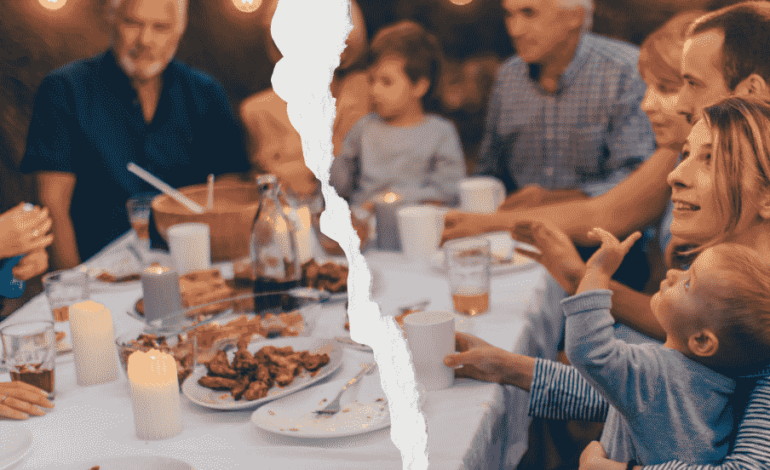Recognizing Potential Triggers and Setting Boundaries Before the Family Feast
November kicks off in full swing into the holiday season. However you choose to celebrate it, the holiday season is supposed to be a joyous time of year aimed to bring friends, family, and neighbors together. However, with all the excitement and joy, there are often moments of stress and anxiety for those in recovery from a substance use disorder or alcohol use disorder. Family ties and finances can feel strained, loneliness can surface, and a runaway train of unrealistic expectations can go off the rails. The stress and anxiety can become amplified to the point that you may experience urges and cravings. Suppose you are recovering from a substance use disorder or alcohol use disorder. In that case, the broad spectrum of holiday emotions can be challenging, even if you have the best intentions for your recovery journey. Relapse rates tend to increase during the holiday season, but this does not mean relapses are unavoidable. There are many steps you can navigate to remain healthy and happy in your recovery journey during this holiday season.
Recognizing potential triggers and situations around the holidays can help you prepare for what is to come and minimize your risk of relapse during the holiday season so you can instead focus on a healthy recovery and all of the joys that come along with the holiday season.
Common holiday triggers for relapse include the following:
- Changes in your daily routine (traveling, time off work, changes to your exercise and mealtime routine, etc.)
- Financial strain (the holidays can be expensive)
- Holiday parties (social anxiety and being around alcohol)
- Family stress (controversial topics such as politics and religion, anxiety about past family trauma, guilt and shame about your addiction, living up to your family’s expectations, etc.)
- Loneliness (many individuals do not spend the holidays with loved ones)
- Seasonal affective disorder or depression
How to stay strong in your recovery during the holiday season
Set boundaries: This can mean saying “no” if you are offered an alcoholic drink at a party or dinner. Other boundaries include:
- Limiting yourself to the number of holiday gatherings you attend Limiting yourself to unhealthy foods that may trigger an urge to use
- Paying close attention to being hungry, angry, lonely, and tired (“HALT”) because these distressing conditions can threaten your recovery.
Boundaries also mean avoiding triggering conversations or people around the holidays. If you are uncomfortable, staying firm on your boundaries is essential, which can mean changing the subject or excusing yourself from the situation. Setting (and keeping) firm boundaries during the holiday season can help you avoid triggers and potential relapse.
Make a budget: financial holiday stress can potentially trigger a relapse, and the holidays can be expensive. The holiday season can leave you financially exhausted, from taking a vacation and buying gifts to purchasing holiday decorations and attending parties. Still, there is no reason to go into debt during this time of year. Set aside time to look at your finances and assess how much you can spend during the holidays without being stressed out financially. This may mean buying fewer gifts, shopping for sales, making gifts, using airline miles to travel, and limiting how many holiday gatherings you attend. The holiday season is not worth going into debt or potentially causing a relapse due to financial strain.
Attend community support meetings: many individuals in recovery skip out on regular community meetings or therapy sessions due to the change in their schedules. Spending time with family and celebrating the holidays is important; however, they should not replace your regular community recovery meetings or therapy sessions. In addition, keeping to your aftercare recovery schedule is essential, as relapse rates can increase if you neglect your regular support groups and therapy sessions.
Have a relapse plan in place: Relapses often occur during triggering circumstances but also happen when you least expect them to. Therefore, it is important to have a relapse plan to outline specific steps you should take if or when you relapse. A relapse plan is usually made while you are enrolled in an addiction treatment program. A relapse plan often includes the following:
- Calling a trusted friend.
- Removing all triggers.
- Telling your therapist or addiction treatment program.
- Undergoing the necessary steps to recognize what underlying causes resulted in your relapse.
A relapse is not a failure in your recovery but rather a misstep that needs to be scrutinized to recognize the underlying triggers and develop a new plan to avoid these triggers in the future.
Rely on a trusted friend or family member: As we dive deeper into the holiday season, everyone will experience some kind of stress, loneliness, anxiety, or negative feelings. It is important to recognize these feelings, sit with them, and talk about them with a trusted friend or loved one. Talking things out, regardless of whether they are about your recovery, the holidays, or daily stressors, can significantly impact your mood and your recovery journey. It is important to remember that recovery cannot be made alone, and it takes many working parts and individuals to navigate a strong and healthy recovery.
Try to maintain your daily routine as much as possible: The holiday season can easily throw off your routine. Hectic travel schedules, holiday gatherings, and time off of work can result in neglecting your self-care routines. You may find yourself exercising less, adopting a different sleep schedule, and eating heavy holiday meals and baked goods. Although these things are not necessarily “bad,” they can affect your emotional and mental state. You may find yourself tired, anxious, and experiencing unwanted weight changes, and therefore it is important to carve time out of your day to check in with yourself and how you are feeling. Try not to change your exercise, nutrition, and sleep schedule, as these three things can drastically change your mood and mindset, potentially harming your recovery journey.
If you are looking to learn more about holidays in recovery, below are additional resources:
Preparing for your first holiday season in recovery
How to handle the upcoming holidays
Recovering from alcohol during the holidays
Expressing gratitude during the holidays
About AKUA Mind and Body
AKUA Mind and Body is a full-service mental health and addiction treatment program that offers a wide range of “east meets west” treatment modalities for various populations across California. AKUA makes your recovery a priority during the holiday and winter seasons and throughout the year. AKUA Mind & Body treats co-occurring disorders and works diligently with each client and their family to ensure that treatment is specifically tailored to their needs and not just their disorder. In addition, AKUA Mind & Body offers detoxification, residential treatment programs, and a wide array of outpatient treatment programs. Regardless of where you are in your recovery process, we want to help.




